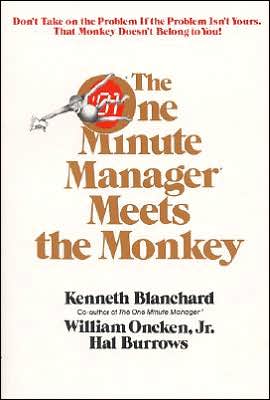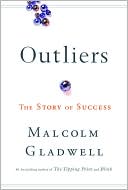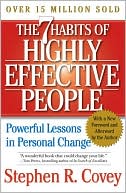One Minute Manager Meets the Monkey
One simple idea can set you free: Don't take on a problem if it isn't yours! One of the most liberating books in the extraordinary One Minute Manager Library teaches managers an unforgettable lesson: how to have time to do what they want and need to do. The authors tell why managers who accept every problem given them by their staffs become hopeless bottlenecks. With a vivid, humorous, and too-familar scenario they show a manager loaded down by all the monkeys that have jumped from their...
Search in google:
One simple idea can set you free: Don't take on a problem if it isn't yours! One of the most liberating books in the extraordinary One Minute Manager Library teaches managers an unforgettable lesson: how to have time to do what they want and need to do. The authors tell why managers who accept every problem given them by their staffs become hopeless bottlenecks. With a vivid, humorous, and too-familar scenario they show a manager loaded down by all the monkeys that have jumped from their rightful owners onto his back. Then step by step they show how managers can free themselves from doing everyone else's job and ensure that every problem is handled by the proper staff person. By using Oncken's Four Rules of Monkey Management managers will learn to become effective supervisors of time, energy, and talent -- especially their own.If you have ever wondered why you are in the office on the weekends and your staff is on the golf course, The One Minute Manager Meets the Monkey is for youit's priceless! Publishers Weekly In this latest in the One Minute Manager series, the authors chastise executives who never have time for family or their own job enhancement because they accept too many responsibilities--``monkeys'' clinging to their backs--that properly belong to their staffs. Based on seminars conducted by the late Oncken, the book explains in simple-minded if abstract terms how to achieve a balance between supervision and delegation for reduced tension and improved productivity. ``There is a high correlation between self-reliance and morale,'' stress the authors. With humor and logic they describe the delicate business of assigning monkeys to the right masters and keeping them healthy, i.e., fed and cared for: `` . . . if monkeys are managed properly, you don't have to manage people so much.'' Unequivocal assignments, proper coaching and interim check-ups, according to this program, can lead to effective delegation and, with it, a better life at home and office. BOMC selection. (Nov.)
Chapter One\ If you are someone who feels overwhelmedwith problems created by other people, what youare about to read can change your life. It's the storyof a manager, but it applies as well to other roles inlife, especially parents and teachers.\ This is the account of how my career went from imminent failure to considerable success after some wise counsel from two able people. My purpose in telling it here is to pass along their wisdom to you in the hope that it will help you as it has helped me.\ The story begins some two years ago after a luncheon meeting with my friend, the One Minute Manager. I returned to my office, sat down at my desk, shook my head in amazement, and thought about what had just happened.\ During lunch I had poured out my frustrations about my work. My friend listened and then told me the cause of my problems. I was astonished that the solution was so obvious.\ What surprised me most was that the problem was self-inflicted. I guess that's why I couldn't see it without some help. But when my eyes were opened I realized that I was not alone; I knew other managers with the same problem.\ As I sat there alone in my office I laughed aloud. "Monkeys!" I said to no one in particular. "I never would have suspected my problem is monkeys."\ For the first time in a long time I remember smiling as I glanced at the picture on my desk of my wife and children. I began to look forward to enjoying more time with them.\ About a year before the "monkey revelation" I had been appointed to my first management position. Things had started off well. I was initially very enthusiastic about my new work, and my attitude seemed to rub off on the people whoreported to me. Productivity and morale gradually increased; both had been reported to be low before I took over as head of the department.\ After the initial surge, however, the output of the department began to decline, slowly at first, then rapidly. The drop in performance was followed by a similar slide in morale. Despite long hours and hard work, I was unable to arrest the decline in my department. I was puzzled and very frustrated; it seemed that the harder I worked, the further behind I got and the worse the performance of my department became.\ I was working extra hours every workday as well as Saturdays and some Sundays. I just never got caught up. There was pressure every minute, and it was extremely frustrating. I feared I was developing an ulcer and a nervous twitch!\ I realized that all this was starting to wear a little thin with my family, too. I was so seldom home that my wife, Sarah, had to manage most of the family problems alone. And when I was home, I was usually tired and preoccupied with work, sometimes even in the middle of the night. Our two kids were also disappointed because I never seemed to have any time to play with them. But I didn't see any alternatives. After all, I had to get the work done.\ My boss, Alice Kelley, had not been initially critical of me, but I began to notice a change in her behavior. She started asking for more reports on the performance of my department. She was obviously starting to watch things more closely.\ Alice seemed to appreciate the fact that I wasn't knocking on her door all the time asking for help. But at the same time she was more than a little concerned about the performance of my department. I knew I could not let things go on like that much longer. Consequently, I made an appointment to see her.\ I told her I knew things had not been going well lately but I hadn't yet figured out how to improve the situation. I remember telling her my workload made me feel as if I were doing the work of two people. I'll never forget her reply: "Tell me who they are and I'll see that one of them is fired because I can't afford the overhead."\ Then she asked me if perhaps I shouldn't be turning over more to my staff. My answer was that my staff was not ready to take on the additional responsibility. Again she responded in a way I'll never forget: "Then it's your job to get them ready! This situation is making me very nervous, and as Benjamin Franklin's grandfather once said:"\ It's Tough\ To Work For\ A Nervous Boss,\ Especially\ If You Are The One\ Who's Making Your Boss\ Nervous!\ \ After my meeting with Alice, I thought a lot about what she had said. Those words "nervous boss" kept coming back to me. I began to realize that Alice was expecting me to handle this situation on my own, probably because she was extremely busy herself on a critical project. That's why I had called the One Minute Manager for help. He was a senior manager in another company and a longtime family friend. Everyone called him the "One Minute Manager" because he got such great results from his people with seemingly little time and effort on his part.\ When we met at lunch, my problems must have shown on my face because the first thing he said was "So, being a manager is not as easy as you thought, eh?"\ "That's an understatement," I answered. I lamented that back in the good old days before I became a manager things were a lot easier because my performance depended strictly on my own efforts. In those days, the longer and harder I worked the more I got done. "That formula seems to be working in reverse now," I told him.\ As I went on to describe my problem in greater detail, the One Minute Manager just listened, only breaking his silence with an occasional question. His questions got more and more specific as the conversation continued. He asked me which aspect of my work was taking the biggest portion of my time. The One Minute Manager Meets the Monkey. Copyright © by Kenneth Blanchard. Reprinted by permission of HarperCollins Publishers, Inc. All rights reserved. Available now wherever books are sold.
\ Publishers Weekly - Publisher's Weekly\ In this latest in the One Minute Manager series, the authors chastise executives who never have time for family or their own job enhancement because they accept too many responsibilities--``monkeys'' clinging to their backs--that properly belong to their staffs. Based on seminars conducted by the late Oncken, the book explains in simple-minded if abstract terms how to achieve a balance between supervision and delegation for reduced tension and improved productivity. ``There is a high correlation between self-reliance and morale,'' stress the authors. With humor and logic they describe the delicate business of assigning monkeys to the right masters and keeping them healthy, i.e., fed and cared for: `` . . . if monkeys are managed properly, you don't have to manage people so much.'' Unequivocal assignments, proper coaching and interim check-ups, according to this program, can lead to effective delegation and, with it, a better life at home and office. BOMC selection. (Nov.)\ \








